Best Animals for 1 Acre Homestead
Do you wish you could have a homestead but worry that you do not have enough room to raise animals? No worries! This article will map out the best animals for 1 acre homestead so you can start to live a self-sufficient lifestyle no matter where you live.
Homesteading tips that will work for anyone, anywhere, and no matter what phase of life they are in.
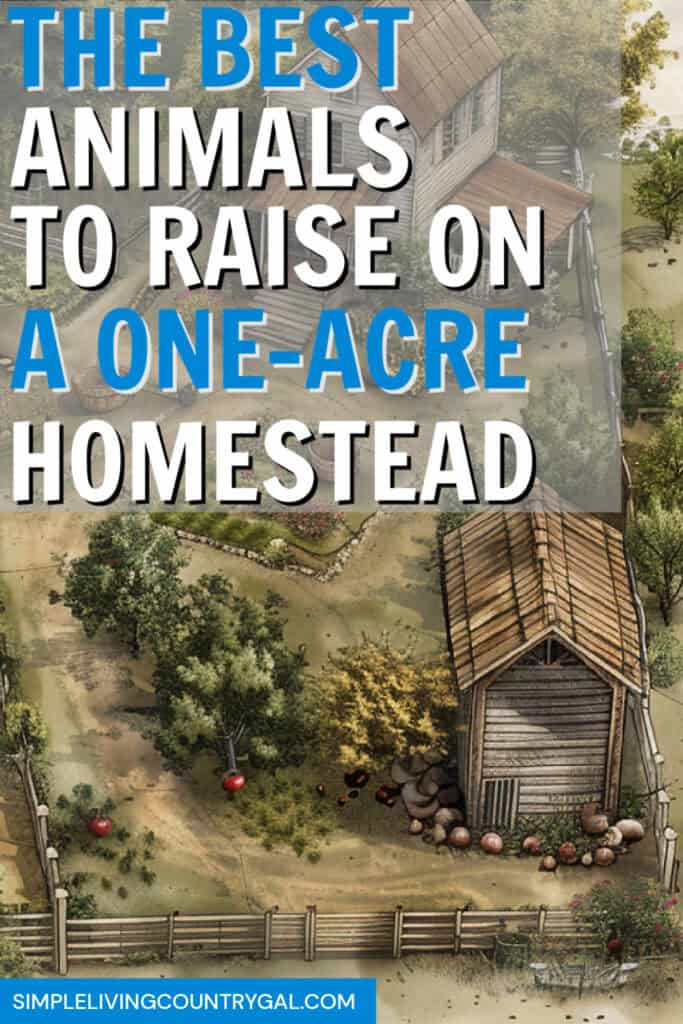
When we first started homesteading, we had a little over an acre of land, with part of that being woods. I thought a garden was all I could have, so I never considered bringing in livestock. Later, I learned that there are animals that thrive in small spaces, and I now know that the options for small-space homesteading are more than folks realize.
Think homesteading is out of reach? Think again! I will show you what animals you can consider, how you can house them on your property, and the best location to put them.
Homesteading on a Small Property
Homesteading on a small property may seem challenging, but it’s far from impossible. In fact, it’s all about organizing where you put things so it compliments your property and the natural resources you have.
With careful planning, even a 1-acre plot can transform into a thriving, self-sufficient homestead. This includes housing for animals, growing food for your family and to sell, and even setting up areas for composting.
The Benefits of Raising Your Own Livestock
Raising your own livestock plays an important part in a homestead. By raising your own animals, you have direct control over the food you consume. This eliminates concerns about hormones, antibiotics, and other chemicals potentially used in commercially raised livestock.
Livestock contributes to a homestead’s circle of life by providing organic fertilizer that can improve the soil where you grow your food. They can also aid in land management, such as controlling pests and removing brush and weeds. And let’s not forget the most obvious reasons: fresh eggs, milk, honey, and meat, all without going to the store.
Heaven’s Harvest Survival Seed Bank Kit (Over 25,000) Fruit & Vegetable Non-GMO Heirloom Seeds for Planting a 3+ Acre Home Garden. 100% Secure: Emergency Weather-Proof Bucket (1-Pack)


Best Animals for a 1 Acre Homestead
This list of animals is a great place to start planning out your homestead. Be sure to make a list of your top choices so you can research more deeply on the pros and cons of each before you make the jump. Another tip is to make a map of your property. This will help you to decide where to house the animals you hope to raise.
#1. Chickens
Chickens are an excellent addition to any homestead and a great place to start if you have never raised livestock. They need little space and can pretty much raise themselves. One of the primary benefits of raising chickens is the constant supply of fresh eggs, which are more vibrant than store-bought…both in color and taste.
Storey’s Guide to Raising Chickens, 3rd Edition


Chicken Benefits:
- Help with pest control – Letting them out to free-range a few hours a day is all you need to control insects and pests that can affect your garden.
- Reduce kitchen waste – Chickens love kitchen scraps, and you can use them to supplement their feed.
- In the garden – Chicken manure is a nutrient-rich organic fertilizer that can help if you have poor soil.
- Chickens are relatively low-maintenance. Daily food, water, and egg collection are all you need for their care. They also adapt to a variety of climates, making them a practical choice for many homesteaders.
Housing and Space Requirements for Chickens
Chickens do require a safe and comfortable coop and outside run area that has enough room for each member of the flock.
- The general rule of thumb is to allow a minimum of 2-3 square feet per chicken inside the coop and about 8-10 square feet per chicken in an outside run.
- Coops need to have adequate ventilation for fresh air circulation and must be kept clean to prevent the spread of diseases.
- Inside the coop, each chicken should have access to a perch for sleeping and a nest box for laying eggs.
- The outside run should have a secure and predator-proof fencing.
- Make sure the housing also has a clean and accessible source of water and food.
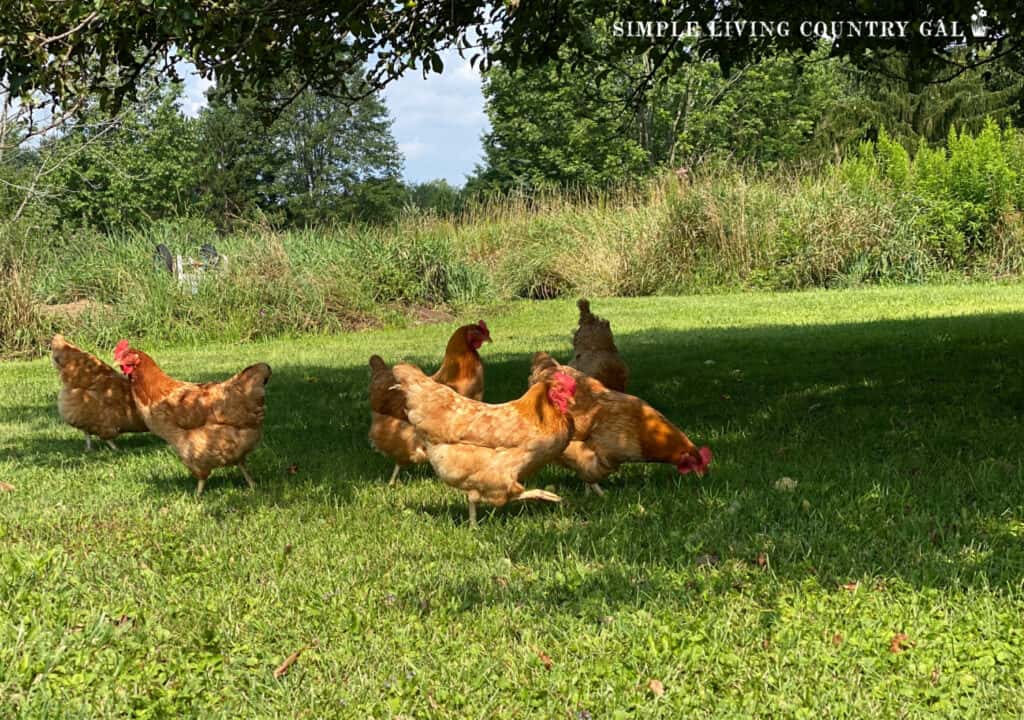
Location Suggestion:
- The coop and run should be placed in an area with good drainage and away from potential predators like raccoons, foxes, or snakes.
- It’s also important to consider the noise level and the possibility of neighbors complaining, so choose a location that won’t disturb others.
- If you plan to free-range your flock, you will want them to be away from any garden areas that you do not want them scratching in as they can damage plants or seedlings.
Remember, space requirements can vary depending on the breed and size of the chicken, so it’s always best to research your specific breed’s needs.
More Tips on Raising Chickens:
#2. Rabbits
Raising rabbits for meat or as pets is another popular choice among homesteaders. They are relatively easy to care for and provide a great source of lean protein.
Rabbit Benefits:
- High-quality protein – Rabbit meat is a lean and nutritious alternative to other meats.
- Low-cost feed – Rabbits can be fed a diet of mostly hay, which is inexpensive and easy to obtain.
- Fertilizer – Rabbit droppings are an excellent natural fertilizer for your garden. They are low in nitrogen but high in phosphorus and potassium, making them ideal for flowering plants.
- Minimal space requirements – Rabbits can be kept in cages or hutches, making them a great choice for those with limited space.
- Quiet and low maintenance – Unlike other livestock, rabbits are relatively quiet and do not require a lot of attention.
In essence, rabbits are a rewarding addition to any homestead, offering a perfect blend of value, efficiency, and simplicity in their care and maintenance.
Housing and Space Requirements for Rabbits
When it comes to housing for rabbits, there are a few things to keep in mind:
- A hutch or cage should provide enough space for the rabbit to hop around and stretch out comfortably. For larger breeds, the recommended minimum size is 30″ x 36″, while smaller breeds can do with a 24″ x 24″ cage.
- The hutch should be placed in a well-ventilated area and have protection from harsh weather conditions.
- It is important to provide a clean, dry bedding material for the rabbit’s comfort and hygiene.
- Like chickens, rabbits also need access to fresh water and food at all times.
Location Suggestion:
Since rabbits need protection from the weather, you can keep their hutches on the backside of a barn or shed. This will take up the least amount of space while giving additional shelter from wind and rain.
Rabbits are a great addition to a 1 acre homestead as they need little space and minimal attention.
Read: Raising Rabbits for Beginners
#3. Goats
Goats are known for their curious and mischievous nature, but they also offer a lot of benefits for homesteaders. Here are some reasons why goats should be considered as part of your homestead.
Goat Benefits:
- Milk – One of the biggest advantages of raising goats is their high milk production. Goat milk is known to be easier to digest than cow’s milk and has a higher nutrient content. It can also be used to make a variety of dairy products such as cheese, yogurt, and butter.
- Meat – Goats are a great source of lean meat, making them a valuable addition to the homestead. Their meat is high in protein and low in fat, making it a healthier alternative to other types of meat.
- Land Clearing – Goats have a natural instinct to graze and can be used for land clearing. They can help control weeds, brush, and unwanted vegetation, making them a cost-effective solution for maintaining pastures.
- Fertilizer – Goat manure is an excellent source of nitrogen, phosphorus, and potassium which are essential for healthy soil and plant growth. It also helps improve soil structure and water retention.
- Companionship – Goats are social animals and can provide great companionship for other livestock on the homestead. They can also be trained as pack animals, making them useful for hauling supplies or equipment.
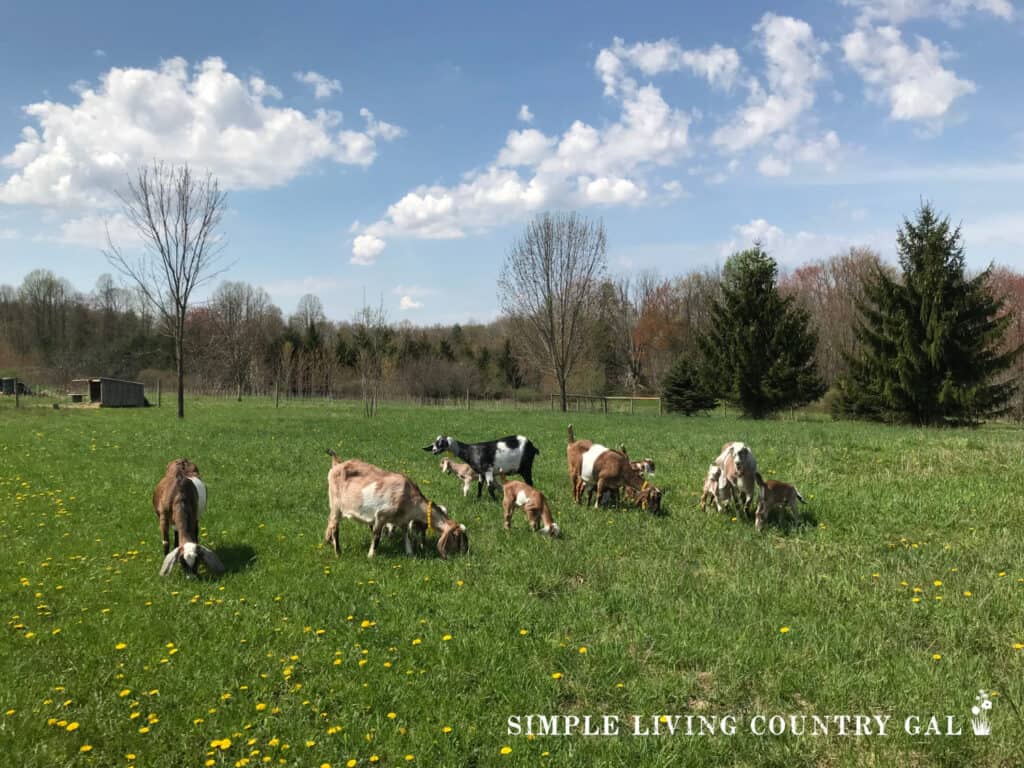
Housing and Space Requirements for Goats
Goats require more housing than chickens and rabbits as they prefer to graze on fresh pasture rather than being confined to a barn or shed.
- Shelter – A basic shelter for goats should have a dry, draft-free area for them to rest and protect them from extreme weather conditions. It should also provide adequate ventilation and be easily accessible for cleaning.
- Shelter space – It is recommended to provide at least 10-15 square feet of shelter space per goat. This can vary depending on the breed, size, and number of goats.
- Outdoor space – Goats need room to roam and graze, so it is essential to have a fenced-in outdoor area for them. The recommended amount of outdoor space is 200 square feet per goat
- Fencing – Good fencing is essential to keep goats contained and safe from predators. The type of fencing you use will depend on your budget and the breed of goat. The most popular options are fence panels, electric fence netting, or high tensile.
Location Suggestion:
When choosing a location for your goat pasture, there are a few things to consider:
- Terrain – Goats do well on hilly or rocky terrain as they are natural climbers and enjoy browsing on different elevations.
- Shade – Make sure the pasture has some trees or structures that provide shade for the goats during hot summer months.
- Access to water – It is important to have a water source close by for your goats to drink from, whether it’s a natural stream or a man-made trough.
- Proximity to your home – It is best to have your goat pasture within sight of your home so that you can easily monitor and care for them. This will be especially helpful during breeding season.
Even though goats do require more space and daily care, their benefits are worth the commitment.
More Goat Care Reads:
#4. Bees
Beekeeping has been gaining popularity as a livestock option for homesteaders. Besides providing delicious honey, bees offer several benefits to a self-sufficient lifestyle.
- Pollination – Bees are crucial pollinators for many plants and crops, making them essential for a successful garden or farm. With more plants being pollinated, you can expect a higher yield of fruits and vegetables.
- Honey production – Bees produce honey, which is a delicious and nutritious natural sweetener. You can use it in cooking, baking, or as a topping for your morning toast.
- Beeswax – In addition to honey, bees also produce beeswax. This natural wax has many uses, such as making candles, soaps, and skincare products.
- Environmental impact – By keeping bees, you are also helping to support and protect the declining bee population. Bees play a vital role in our ecosystem, and their presence can have a positive impact on the environment.
Housing and Space Requirements for Bees
Unlike traditional livestock, bees don’t require much space or housing. However, there are a few things to consider when providing a home for your bees.
- Hive placement – Hives should be placed in an area that receives plenty of sunlight and has easy access to water sources nearby.
- Hive design – There are different types of hives available, but the most popular is the Langstroth hive. This design allows for easy honey extraction and is suitable for beginners.
- Space – You don’t need a large yard or acreage to keep bees. A small backyard can accommodate one or two hives, depending on local regulations and available forage.
Location Suggestion:
- Away from human traffic: Bees can become defensive and protective of their hive, so it’s best to keep them away from areas with high foot traffic.
- Near water sources: Bees need access to water for hydration and cooling down the hive during hot weather. Consider placing a water source, such as a birdbath or shallow dish, near the hive.
- In an open area: Hives should be placed in an open area with plenty of sunlight. Avoid placing them near tall trees or buildings that can block their flight path.
- Facing east/southeast: Placing hives facing east or southeast allows for early morning sun exposure, which helps the bees start their day and increases colony productivity.
Bees are a great addition to consider adding to your homestead as they need little space and need minimal care.
#5. Ducks or Geese
Ducks and geese are another popular option for homesteaders. They can provide eggs, meat, and pest control, making them a practical choice for any homestead.
Benefits of Raising Ducks or Geese
- Eggs – Both ducks and geese lay delicious and nutritious eggs that are larger than chicken eggs.
- Meat – Duck and goose meat is lean and flavorful, making it a healthy protein option for homesteaders.
- Pest control – Ducks and geese are great at controlling pests in the garden, such as slugs, snails, and insects.
Housing and Space Requirements for Ducks or Geese
- Shelter – Ducks and geese will need a shelter to protect them from predators and harsh weather. A simple wooden coop or shed will suffice.
- Water – Both ducks and geese need access to a body of water, such as a pond or kiddie pool, to swim and clean themselves.
- Grazing space – Ducks and geese require ample grazing space for their daily exercise and foraging. A small pasture or fenced-in area will work well.
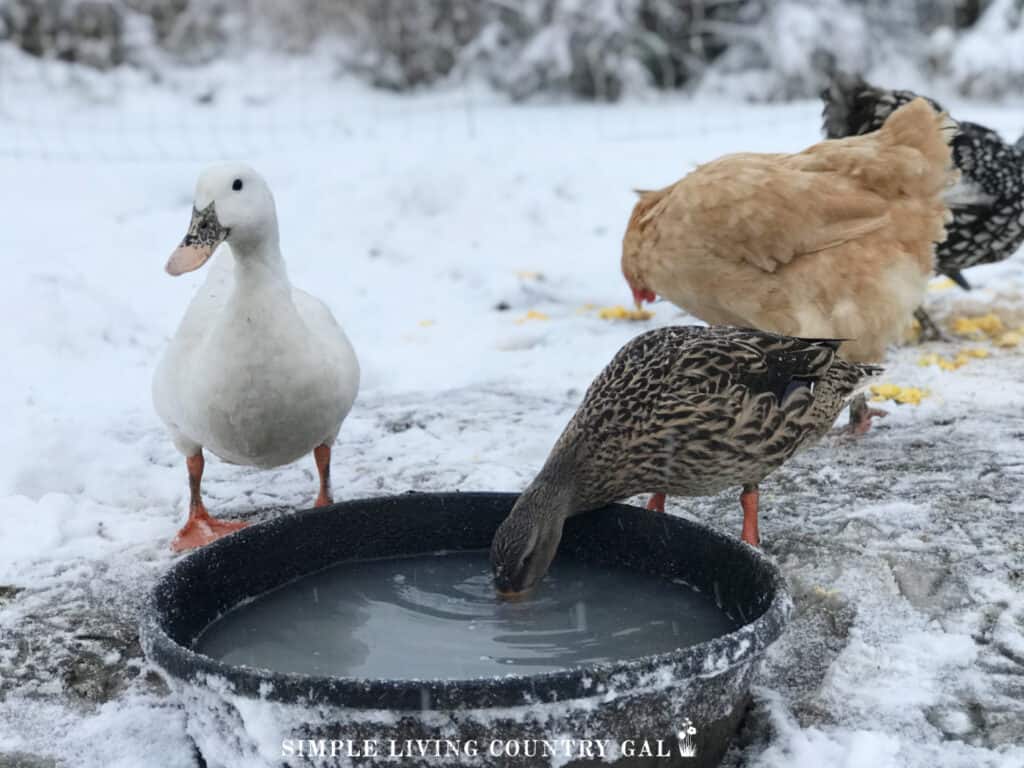
Location Suggestion: Near a Pond
- Consider placing your duck or goose coop near a pond. This will provide easy access for them to swim and also attract natural insects as food.
- Both ducks and geese are quite noisy animals, so be mindful of your neighbors if you live in a suburban area.
- If you are raising chickens you can keep everyone together saving the most space.
We love having ducks on our homestead mainly because they are fun to raise but also for their larger-sized eggs and protective nature, alarming us of any dangers.
More Duck Care Tips:
#6. Pigs
Pigs are a popular choice for homesteaders due to their ability to convert food scraps into delicious, high-quality meat.
Benefits of Raising Pigs
- Meat – Pigs provide a large quantity of meat and can be raised on pasture or in a barn.
- Compost – Pig manure makes excellent compost for your garden.
- Food recycling – Pigs can eat a variety of food scraps and leftovers, reducing waste on your homestead.
Housing and Space Requirements for Pigs
- Shelter – Pigs need shelter from the sun, wind, and rain. A simple three-sided shed with straw bedding is sufficient.
- Fencing – Pigs are notorious escape artists, so sturdy fencing is a must to keep them contained. Electric fencing is a popular choice for pigs.
- Grazing space – Pigs need ample grazing space to roam, root, and forage. A fenced-in pasture or wooded area works well for this purpose.
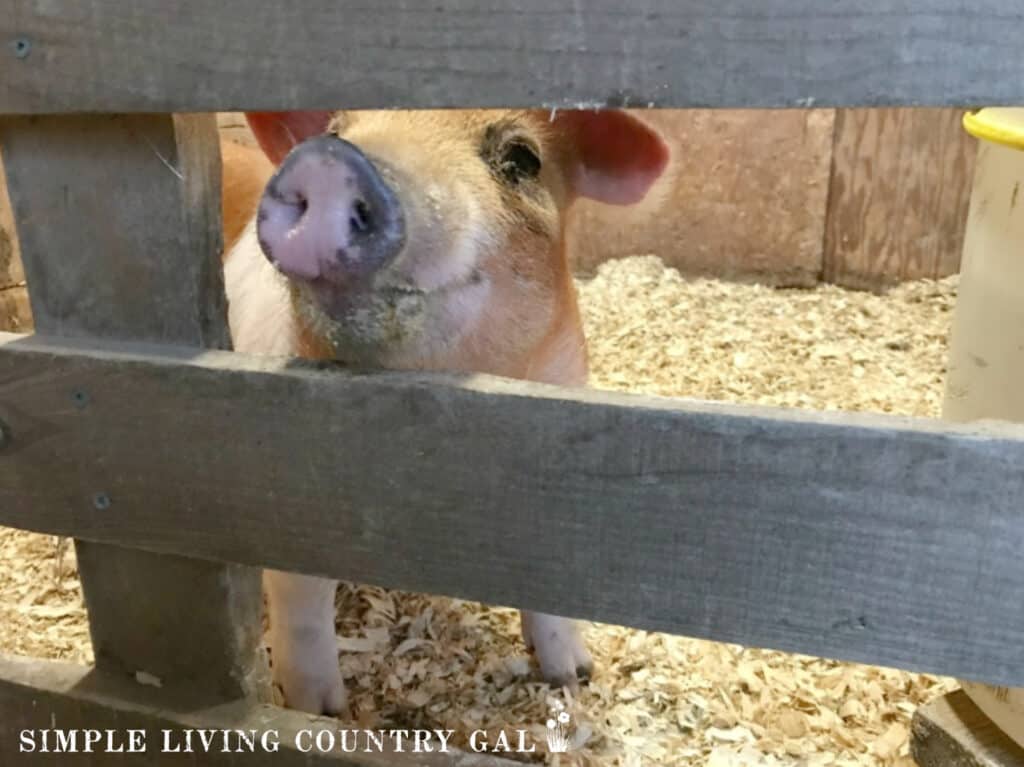
Location Suggestion: Pasture with Access to Shelter
- The ideal location for a pig pasture would be a sunny, well-drained area near the barn or shelter.
- Pigs are smelly so putting their housing downwind of your home will help with any odors.
- Make sure there is enough room for the pigs to graze and root without getting too close to any gardens or other livestock areas.
- If you live in an area with harsh winters, consider building a winter shelter for your pigs to keep them warm and protected from the elements.
- You also need protection from the sun as pigs can get sunburned quite easily.
Pigs are also known to be intelligent and social animals that can form close bonds with their owners. Even though they do not take up much space, they can make a mess of your living area, needing more care than other animals.
If you have an acre of land for homesteading, any of these options will be a great fit. Knowing the land you have and the different terrains, and choosing the best location for each animal so they are comfortable and safe. This list of best animals for 1 acre homestead will help you create a self sufficient home that will support your family for years to come.









Worms would be a good option helps with composting as well as a side income for fishing and chickens.